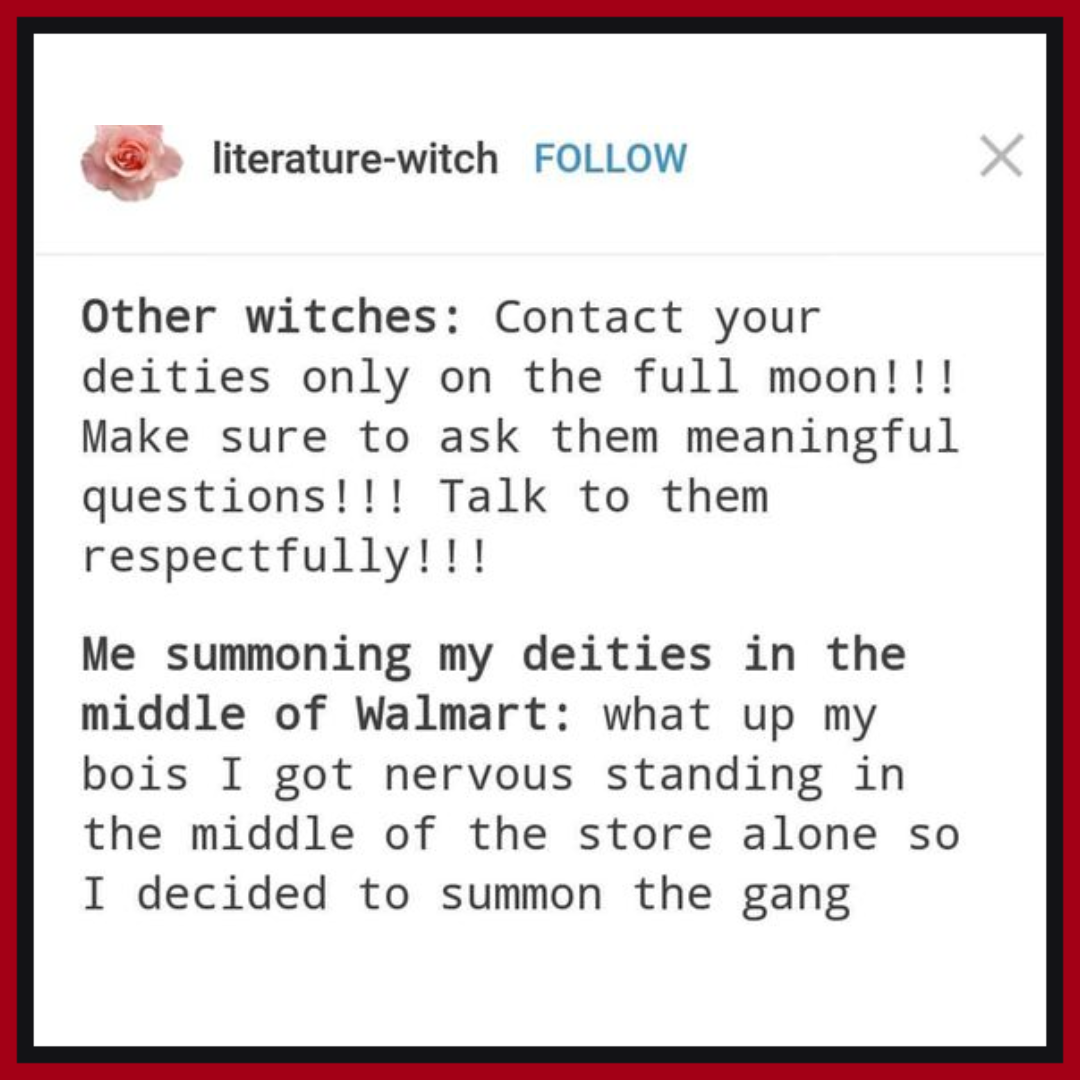Witchcraft and Selfcare: A Cycle

It can be hard to find time to do a ritual. In fact, a lot of witch tumblr is dedicated to this:




First of all: using alphabet soup as divination needs to become a thing.
Second: I think that anyone who has tried witchcraft has been there. And in this post, I want to talk about why that's not only okay—it's actually necessary.
See, I see a lot of posts and tweets and tiktoks talk about how “lazy witchcraft is valid”. And it completely is. But for me, I aspire to high ritual—I aspire, one day, to have a set of robes of every color, ready for whatever kind of ritual I want to perform—white for a blessing, black for protection, pink for getting on my hot and heavy vibes™. I want an alter cloth that I spent days embroidering with blood, sweat, and tears (usually literally) upon which I can lay out my crystals and candles. I want to burn sigils embroidered on soft cloth, I want to drink potions brewed with crystals in the infuser. I have aspirations to incorporate beautiful, lush witchcraft into my day to day life.
But sometimes, I am 'tapwater sailormoon' witch. I bless my partner's coffee by grinding it clockwise, then call it a day on my ritual practice, and I go to bed feeling like I could have done more—and that if I had done more, I would feel better about myself.
The important thing about being a witch, to me, is doing the rituals and work that you connect with. I love color symbolism. I am drawn to it. So I incorporate it in almost everything. I love flames (who doesn't); so I burn candles and sigils and herbs. It's nice having a real fireplace that I can use as an altar nowadays, so I don't have to worry about the smoke alarms going off.
But I also struggle with depression. And a lot of other things. But the depression is the relevant one here. And depression doesn't want to do rituals: depression wants to play the Sims for seven hours, then eat boxed mac n cheese, cry, then sleep, all without having drunk any water all day long.
Like with artists, I think there's a stereotype of the 'depressed, wise, reclusive witch'. But once again, like with artists, a successful witch is a happy, healthy witch. Depressed me doesn't do rituals. It's happy, or at least healthy, me that's willing to put in the hours of work it takes to make altar cloths; the little intentionality and extra steps to make my tea into a potion; the set aside time and space to do a little candle work.
So let's talk about the place lazy witchcraft actually should hold. This is obviously just my opinion—what I have lived. After all, my aspiration is for the fancy witchcraft. But if you aspire to be a ravioli witch, have at it—as I said earlier, I completely support this. Please send photos of your ravioli witchcraft to my personal Mastodon account, The_Augusto@mstdn.social. I want to see this.
But if you aspire to the artsy, fancy, make-your-mother-pray-extra-hard-for-you witchcraft, but you find yourself being stymmied by mental illness, here's my advice:
Don't focus on the fancycraft for a bit.
Focus on your mental health.
Get a therapist. Get meds. Go to therapy. Use the Finch self care app (not a sponsored post I swear), or some equivalent that works for you.
Then start incorporating your witchcraft into it. Have you been journaling? Start putting sigils on the top of your journal entries. Have you been hydrating? Stick some (non-soluable) crystals in the bottom of your water bottle. Do your lazy witchcraft as an integration and an enhancement of your self care.
It will start coming naturally. I was sick the other day, and still am—everything hurt. I thought a bath might help. But I didn't just take a nice hot bath—I stuck some obsidian and smoky quartz in the bottom, to try and absorb that bad, negative sick energy. I put in some agate to try to reinvigorate myself. I floated chamomile on the top to bless my body.
The bath didn't end up helping—not physically, anyway. But I felt a little rejuvinated that I had tried. That I had gone out of my way to set my intention with my bath, even if my body hurt as much afterwards as it did before.
And maybe that does mean it worked.
As time passes, it'll be easier to do bigger and bigger witchcrafts—because hopefully, with self care and meds and therapy, you'll start to heal. Your little self care witchcrafts will get more and more elaborate.
And soon, you'll look up, and you'll find that you're in the robes that you knit on that bad day as a concentration and healing spell, using the altar cloth you embroidered over six months of quiet self care time, performing little spells that you came up with to bless your coffee in conjunction to make an incantation that would make your Catholic great grandmother have a stroke on the spot.
I don't think this is just true of witchcraft, either. For my friends who are more traditionally religious, I think this can apply to prayer or devotion—I know that I used to feel like a bad Christian for not having hours-long bible reading sessions. And while there's probably a lot of Christian guilt to unpack there, starting small, with a verse before bed or writing a blessing from psalms on your meds box, can probably work in a similar way. Or, for my artist friends—not every project has to be huge and expansive, especially when mental health is involved. A little doodle in your therapy journal, or a song you wrote about taking meds that you hum in the morning, can be your own little ritual.
So go forth, and may your lazy witchcraft—or art or prayer—be blessed.